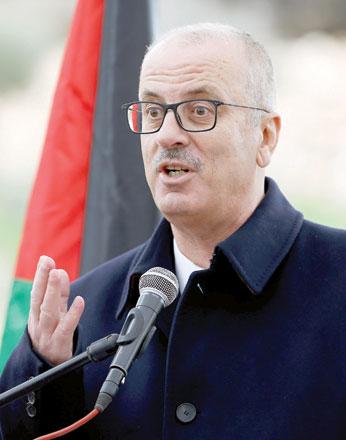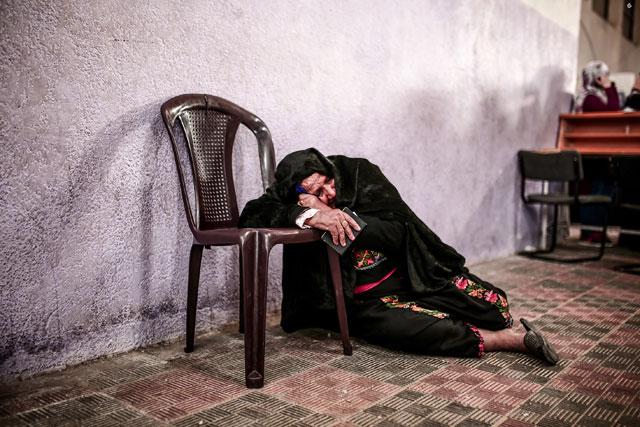You are here
Palestinian PM willing to quit if President Abbas wishes
By AFP - Jan 28,2019 - Last updated at Jan 29,2019

Palestinian Prime Minister Rami Hamdallah gestures as he speaks during the opening ceremony of a health centre near Hebron, in the Israel-occupied West Bank, on Monday (Reuters photo)
RAMALLAH, Palestinian Territories — Palestinian Prime Minister Rami Hamdallah offered to resign on Monday, as President Mahmoud Abbas seeks to form a new government.
The move by Abbas is seen as part of attempts to further isolate his political rivals, Hamas, as a decade-long split in Palestinian politics deepens.
Hamdallah has ‘‘put his government at the disposal of President Mahmoud Abbas’’, the prime minister's spokesman Yussef Al Mahmud said in a statement.
The premier later confirmed the offer during a visit to the southern West Bank city of Hebron, but denied a new government was an attempt to squeeze Hamas.
‘‘We hope that all Palestinian factions will participate in this [new] government and I appeal to the Hamas movement to participate,’’ he said.
It came after the central committee of Abbas's Fateh movement recommended late on Sunday the formation of a new government that would comprise members of the Palestine Liberation Organisation (PLO).
The Islamist movement Hamas, which runs the Gaza Strip, is not part of the PLO.
Palestinian politics has essentially been paralysed since 2007, when Hamas seized control of Gaza from Abbas's forces in a near-civil war, a year after winning parliamentary elections.
Since then, Abbas's governments have maintained limited self-rule in the occupied West Bank, while Hamas has led a rival government in Gaza.
The division between the Palestinian parties is seen as a key issue preventing progress in solving the Israeli-Palestinian conflict and improving the situation in the impoverished Gaza Strip.
In June 2014 Hamdallah formed what was labelled a “national unity government” after a landmark reconciliation deal between Fatah and Hamas.
The deal has since broken down, and his government has no control in Hamas-controlled Gaza.
Abbas was elected in 2005 for an initial four-year term but no elections have been held since then due to the Fateh-Hamas split.
'No legitimacy'
Abbas has also pledged to hold new parliamentary elections in the coming six months, but how that would be possible in Gaza is unclear.
Hamas won the last parliamentary polls, in 2006, against expectations.
Israel, the United States and other Western powers, which all consider Hamas a terrorist organisation, rejected the result.
Hamas and Israel have fought three wars in Gaza since then.
Rumours of a new government have been swirling in recent weeks, and Hamas spokesman Sami Abu Zuhri attacked such a plan.
‘‘The formation of any government apart from a national consensus one is a continuation of the unilateral actions taken by Fateh,’’ he Tweeted on Sunday.
‘‘Such a government will enjoy no legitimacy.’’
It remains unclear what form any future government could take, but analysts warned that keeping Hamas out of it would deepen political divisions.
‘‘The move has been described as furthering national unity but, if anything, such a move — if Hamas is excluded — may achieve the opposite, compounding current internal divisions, and pushing Gaza further away,’’ said Hugh Lovatt, Israel-Palestine analyst at the European Council of Foreign Relations.
Jihad Harb, a West Bank-based political analyst, said if a government were formed from only the PLO it would indicate an end to already stalled attempts at reconciliation.
‘‘The formation of this political government means the end of the [2014] agreement [between Hamas and Fateh]," he said.
Related Articles
RAMALLAH, Palestinian Territories — Palestinian president Mahmoud Abbas appointed long-time ally Mohammad Shtayyeh as prime minister on Sund
RAMALLAH, Palestinian Territories — Leading Palestinian political factions are to gather on Tuesday in Cairo to push ahead with reconciliati
RAMALLAH, Palestinian Territories — The Palestinian government submitted its resignation on Tuesday, a statement said, a move seen as a bid

















